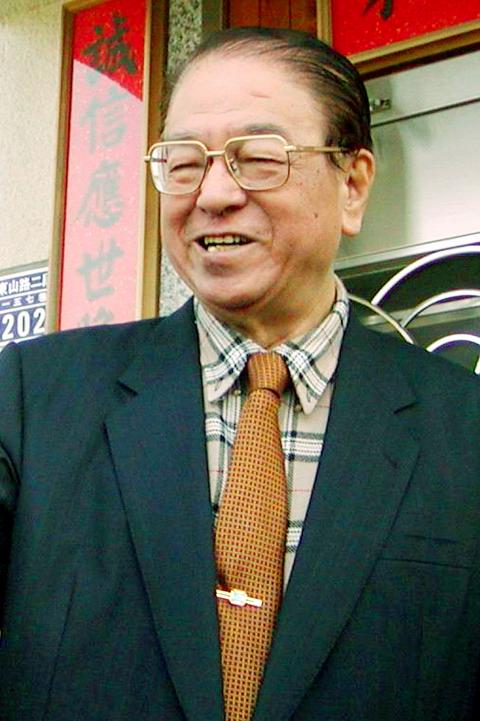Former presidential adviser Lin Yang-kang (林洋港), a Chinese Nationalist Party (KMT) heavyweight who faded from the political scene after losing the nation’s first direct presidential election in 1996 to former president Lee Teng-hui (李登輝), died on Saturday midnight of intestinal obstruction and organ failure. He was 87.
Lin, also known as Uncle A-Kang (阿港伯), was one of the so-called “Taiwanese youths” cultivated by the KMT to consolidate grassroots support. He had served as Nantou County commissioner, Taipei mayor, chairman of Taiwan Province, minister of the interior and head of the Judicial Yuan, and was once seen as the likely successor to former president Chiang Ching-kou (蔣經國).
Chiang instead picked Lee as his vice president, which sparked a power struggle between Lin and Lee. In the 1996 presidential election, Lin violated KMT regulations and paired up with former premier Hau Pei-tsun (郝柏村) to compete against Lee and former vice president Lien Chan (連戰). The Lin-Hau ticket lost the election and Lin’s party membership was revoked for years until the KMT restored it in 2005.

Photo: CNA
Lin left politics after retiring from his post as an adviser to the Presidential Office in 2006, and went to live in Greater Taichung with his family.
President Ma Ying-jeou (馬英九) yesterday expressed his condolences to Lin’s family and praised Lin’s life-long dedication and achievements, including the decision to build the Taipei Feitsui Reservoir in 1978 amid concerns about the reservoir’s possible threat to local residents’ safety if it were destroyed in a natural disaster.
“His vision allowed people in the Greater Taipei area to enjoy clean and cheap drinking water for the past 20 years. It was a very wise decision,” Ma said in a written statement.
Ma also expressed his gratitude for Lin’s advice, saying he had often discussed judicial matters with Lin when serving as minister of justice. Lin, then the minister of the Judicial Yuan, helped facilitate cooperation between the Judicial Yuan and the Ministry of Justice.
KMT heavyweights, including Legislative Speaker Wang Jin-pyng (王金平) and Taipei Mayor Hau Lung-bin (郝龍斌), son of Hau Pei-tsun, also expressed regret over Lin’s death.
Wang described Lin as a respectful politician who made great achievements, and said politicians in future generations should learn from his dedication to Taiwan’s development.
Hau Lung-bin thanked Lin for building the Feitsui Reservoir for Taipei, saying it prevented a shortage of drinking water for Greater Taipei residents.

A preclearance service to facilitate entry for people traveling to select airports in Japan would be available from Thursday next week to Feb. 25 at Taiwan Taoyuan International Airport, Taoyuan International Airport Corp (TIAC) said on Tuesday. The service was first made available to Taiwanese travelers throughout the winter vacation of 2024 and during the Lunar New Year holiday. In addition to flights to the Japanese cities of Hakodate, Asahikawa, Akita, Sendai, Niigata, Okayama, Takamatsu, Kumamoto and Kagoshima, the service would be available to travelers to Kobe and Oita. The service can be accessed by passengers of 15 flight routes operated by

MORE FALL: An investigation into one of Xi’s key cronies, part of a broader ‘anti-corruption’ drive, indicates that he might have a deep distrust in the military, an expert said China’s latest military purge underscores systemic risks in its shift from collective leadership to sole rule under Chinese President Xi Jinping (習近平), and could disrupt its chain of command and military capabilities, a national security official said yesterday. If decisionmaking within the Chinese Communist Party has become “irrational” under one-man rule, the Taiwan Strait and the regional situation must be approached with extreme caution, given unforeseen risks, they added. The anonymous official made the remarks as China’s Central Military Commission Vice Chairman Zhang Youxia (張又俠) and Joint Staff Department Chief of Staff Liu Zhenli (劉振立) were reportedly being investigated for suspected “serious

ENHANCING EFFICIENCY: The apron can accommodate 16 airplanes overnight at Taoyuan airport while work on the third runway continues, the transport minister said A new temporary overnight parking apron at Taiwan Taoyuan International Airport is to start operating on Friday next week to boost operational efficiency while the third runway is being constructed, the Ministry of Transportation and Communications said yesterday. The apron — one of the crucial projects in the construction of the third runway — can accommodate 16 aircraft overnight at the nation’s largest international airport, Minister of Transportation and Communications Chen Shih-kai (陳世凱) told reporters while inspecting the new facility yesterday morning. Aside from providing the airport operator with greater flexibility in aircraft parking during the third runway construction,

American climber Alex Honnold is to attempt a free climb of Taipei 101 today at 9am, with traffic closures around the skyscraper. To accommodate the climb attempt and filming, the Taipei Department of Transportation said traffic controls would be enforced around the Taipei 101 area. If weather conditions delay the climb, the restrictions would be pushed back to tomorrow. Traffic controls would be in place today from 7am to 11am around the Taipei 101 area, the department said. Songzhi Road would be fully closed in both directions between Songlian Road and Xinyi Road Sec 5, it said, adding that bidirectional traffic controls would